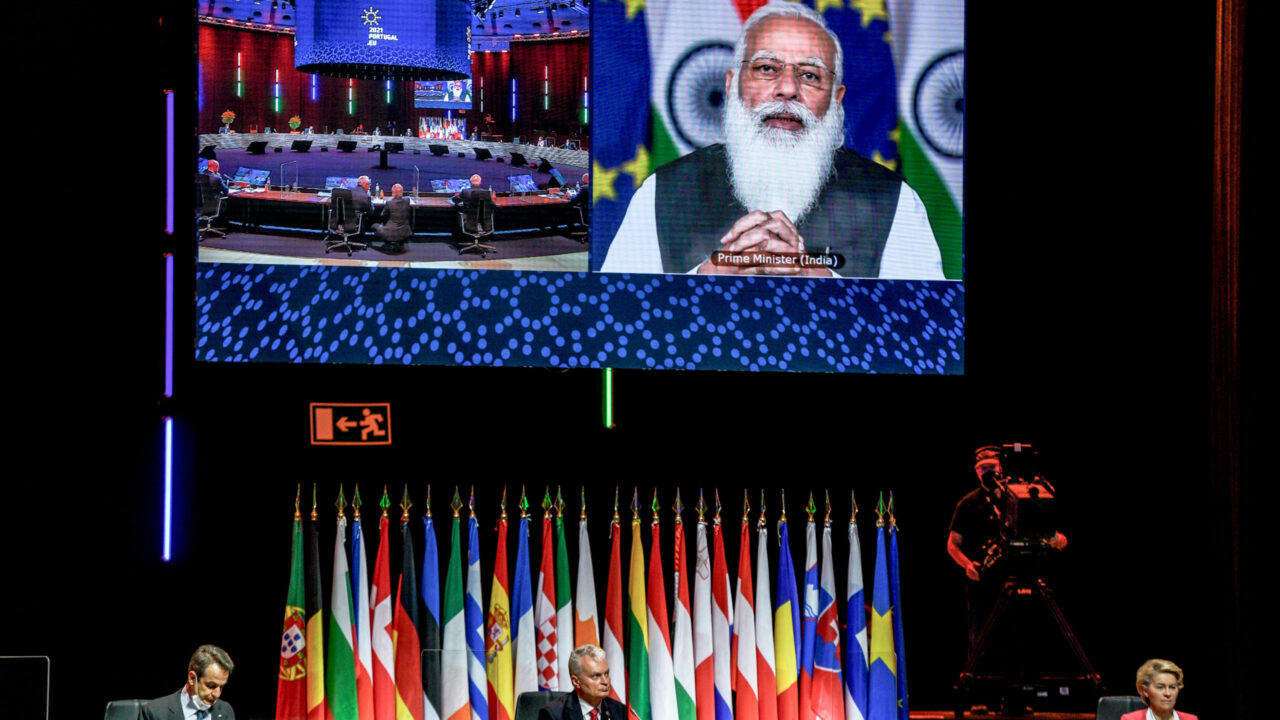Indo-specific: The potential of the EU-India Leaders’ Meeting
The EU’s and India’s willingness to fulfil the untapped economic potential of their relationship indicates that their positions might still quite far apart but, for geopolitical reasons, they want to reach a compromise
The first-ever EU-India Leaders’ Meeting, held virtually on 8 May, produced the sides’ only negotiations on trade and investment protection since 2013. Their renewed willingness to discuss these issues – which they had no coherent economic reason to drop – reflects their strategic concerns about the emergence of a Chinese-dominated economic bloc in Asia through the Regional Comprehensive Economic Partnership (RCEP). With both the European Union and India outside RCEP, Indian Prime Minister Narendra Modi and the leaders of the 27 EU member states also concluded a connectivity partnership – which is designed to have mutual benefits on connectivity in areas such as digital connectivity, transport, and energy, as well as scientific mobility.
The sides have regularly expressed high expectations for developing their relationship, only to become disillusioned with it just as often. Nonetheless, two weeks before the summit, the EU adopted Council conclusions on its strategy for the Indo-Pacific. This paved the way for a new, more urgent approach to the region, particularly India, in light of the covid-19 crisis – a shift in that should help the EU translate the Indo-Pacific concept into substantive policies.
Democracies’ response to the pandemic has tarnished their international reputations and weakened them economically. Ever since China stabilised its own health situation, it has made its management of the pandemic a propaganda tool. Meanwhile, Europe’s initial unpreparedness for, and India’s chaotic handling of, the pandemic have projected a poor image of democracies’ capabilities in the face of adversity. The solidarity with India that the EU demonstrated before and during the leaders’ meeting helps offset these negative impressions, and sends a clear message about the reality of a community of democratic values.
Europe needs an India that can provide a market for its products, contribute to the diversification of its supply chains, and help it maintain a stable and peaceful – if uneasy – relationship with China.
On the economic front, the pandemic has only reinforced pre-existing trends. India’s economic growth, which started to accelerate in the early 1990s, began to slow around 2013 and has been in decline since 2016. As explained by Sanjaya Baru, former director of the Federation of Indian Chambers of Commerce & Industry, ‘Brand India’ has waned – albeit only marginally, given that many states continue to see New Delhi as a potential counterweight to Beijing (despite Indian leaders’ reluctance to accept the role). The pandemic further undermined the economic foundation of India’s political status and hit its image hard, while demonstrating Europe’s excessive dependency on China for the supply of some critical goods.
The resumption of EU-India negotiations on trade, investment protection, and geographical indication is at the centre of these concerns. Europe needs an India that can provide a market for its products, contribute to the diversification of its supply chains, and help it maintain a stable and peaceful – if uneasy – relationship with China. India needs European investments and technology to restore its economy, satisfy the growing demand for jobs from its young people, and maintain its power asymmetry with China at politically manageable levels. India also needs European investment more than trade, and seems ready to make the necessary concessions to obtain it. Europe is perhaps more flexible on this issue than it once was, as a growing number of member states realise that a strong India is in their strategic interest – even if they keep insisting on the need for an “ambitious, comprehensive” trade agreement. From this perspective, the EU’s and India’s creation of a high-level dialogue indicates that their positions are still quite far apart but, for geopolitical reasons, they have a new political will to reach a compromise.
Connectivity is perhaps the one issue on which the leaders’ meeting has done most to breathe life into the Indo-Pacific concept. India has been obsessed with connectivity for some time, as the country is located in a poorly integrated region in which political fragmentation has helped China expand its influence. Indeed, the term ‘connectivity’ has become synonymous with the Indo-Pacific, as it reflects a desire to counter the Chinese Belt and Road Initiative. For some time, the EU had been pushing to make a more ambitious connectivity agenda a key feature of its foreign policy. The bloc’s connectivity strategy, set out in 2018, recently found its way into its nascent Indo-Pacific strategy.
However, despite its considerable financial capacity, the EU has so far been unable to translate its intentions into concrete projects. The EU-India connectivity partnership should help the bloc finally do so in India itself and in third countries, and could thereby increase the visibility and political commitments of its engagement with Asia. India and the EU not only complement each other in the endeavour but have common strategic objectives in it: they both want to involve the private sector in an approach that is less spectacular but more sustainable than China’s.
The Indo-Pacific concept underpinned many of the conversations at the leaders’ meeting, even if the participants rarely discussed it directly. In that sense, the summit demonstrated the convergence of the EU’s and India’s visions of the strategic evolution of the region. The process of reifying the Indo-Pacific concept remains uncertain and has not fundamentally changed the EU’s relationship with India. Yet the sides now have a better understanding that, unless they pursue the ideas behind the concept, they risk a gradual slide into geopolitical irrelevance.
The European Council on Foreign Relations does not take collective positions. ECFR publications only represent the views of their individual authors.



